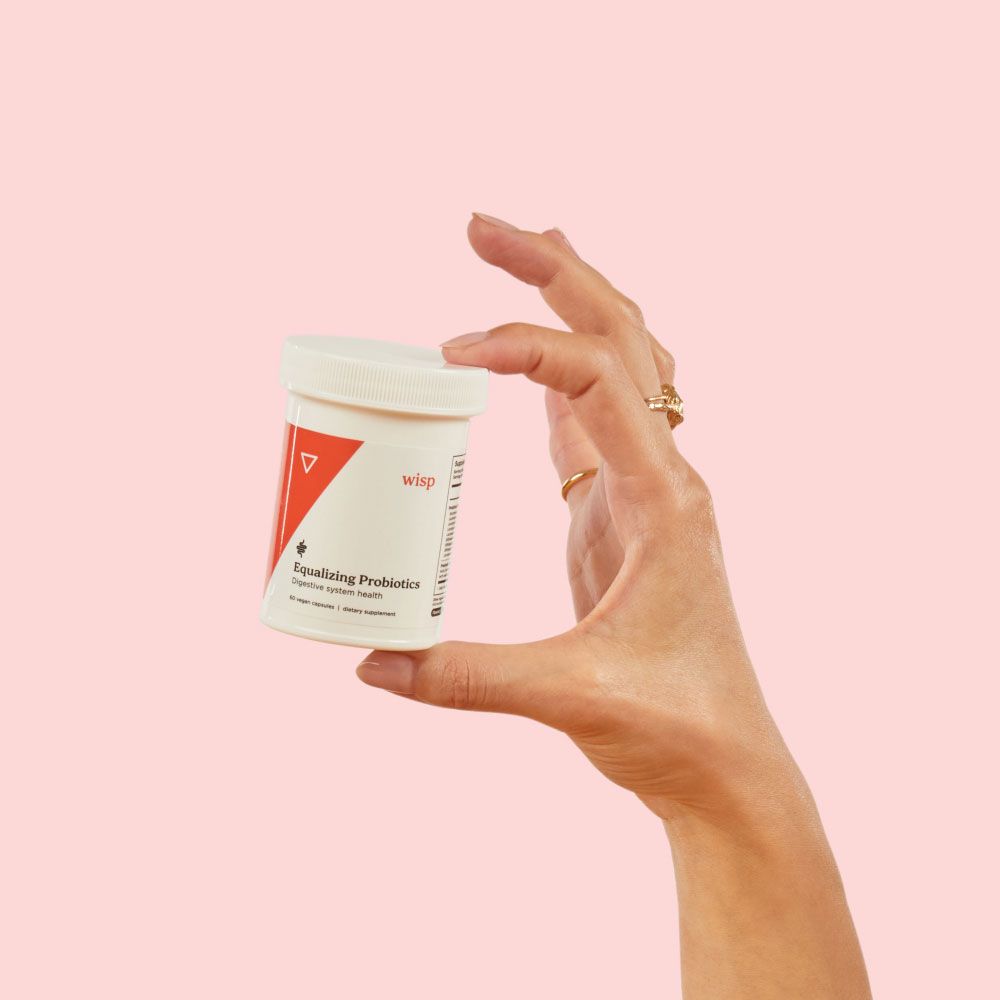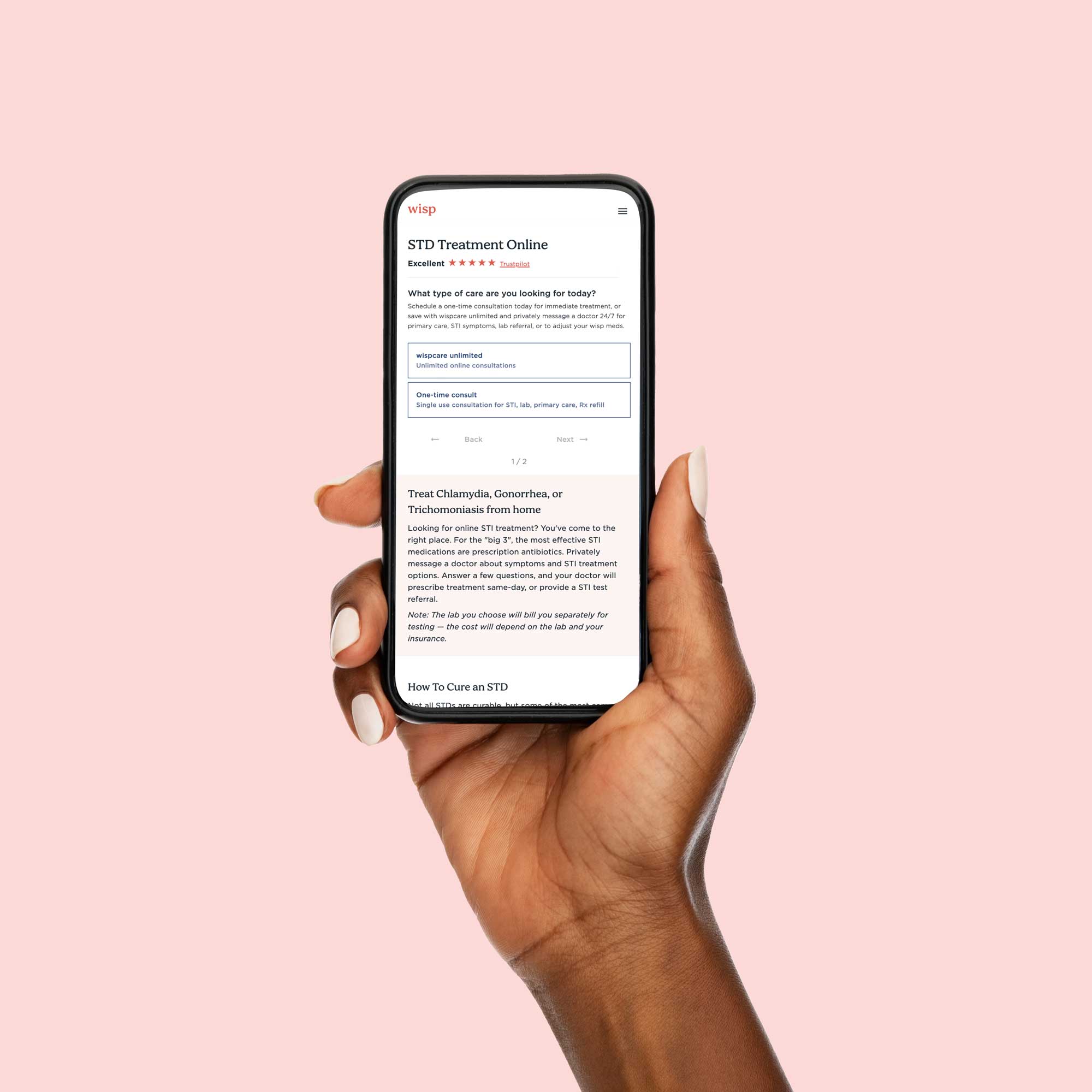
Can Chlamydia Go Away
on Its Own?
By Kathleen Morrison
April 21, 2021
Can Chlamydia Go Away on Its Own?
An chlamydia diagnosis can be super unnerving. You might be thinking, "How did I get it?" "Have I passed it to anyone else?" "How long does it take for chlamydia to go away?" and "I can't possibly see a doctor—I'm too embarrassed."
Well, you're not alone, and you have no reason to be embarrassed—STIs like chlamydia are usually totally treatable and also way more common than you might think. Chlamydia does go away with prescription antibiotics. You should talk to a healthcare provider right away if you think that you might have chlamydia or any other STI or infection. With the right treatment, you'll feel emotionally and physically better, and you'll be able to get back to your life. Let's learn about the treatment for chlamydia and debunk a few other myths about it while we're at it.
Does Chlamydia Clear Up on Its Own?
First and foremost, chlamydia does not go away untreated. In fact, it can develop into some pretty gnarly stuff when left unchecked, so it's best to get medication ASAP. Luckily, chlamydia is straightforward and easy to treat. A round of chlamydia antibiotics is the most common treatment for chlamydia. With the use of an effective prescription medication, chlamydia often goes away in a couple of weeks and you'll be completely cured.
Can Chlamydia Come Back?
So you've finished all your meds, your symptoms have disappeared, you're all good, right? Hold on there — before you jump back into bed with your partner (or partners) you'll want to make sure they are healthy too! The most common symptom of chlamydia is no symptoms at all: up to 75% of people with vaginas and up to 50% of people with penises who have chlamydia do not experience any symptoms. That doesn't mean that the infections aren't doing harm — an asymptomatic infection still requires treatment to avoid long term complications. Let your doctor know if you have a partner that you've had unprotected sex with — your provider will often send you home with a dose of medication for your partner to take so they don't give you chlamydia after you've been treated.
Condoms (and other barrier methods) are also very effective at ensuring your chlamydia doesn't come back. It's important to get STI testing done between partners, but if you can't, it's extra important to use a condom to protect against STIs, including chlamydia, gonorrhea, and HIV. Always use a condom with any partners until you've both been tested for STIs and have both gotten a clean bill of health.
If I Have Chlamydia Once, Am I Immune to It?
Unfortunately, chlamydia isn't like chickenpox. You're not immune to it once you get it. You can get reinfected once your initial infection clears up or at any time in the future, so it's best to take precautions like these when having sex to avoid reinfection or getting other STDs:
- If you have chlamydia, don't have sex until your symptoms clear up and you get the okay from your provider
- Use condoms when having sex to protect you from STD transmission
- Get tested for STDs regularly
- Get tested for STDs when beginning a new intimate relationship. Ask your partner to get tested, too, for good measure.
Can I Get Chlamydia From Oral or Anal Sex?
Yes, you can get chlamydia from any type of sexual contact, even if it's not traditional intercourse. Oral and anal sex can also lead to an infection. Follow the same guidelines we already mentioned to protect you and your partner or partners from contracting chlamydia.
I Can't Have Chlamydia If I Just Have One or Two Partners, Right?
Chlamydia is one of the most common STIs in the US. The CDC estimates that there were 4 million chlamydia infections in 2018 alone, and many of those people didn't know they had an infection. While STIs are sometimes associated with getting busy—like, really busy—the truth is you could get chlamydia the very first time you ever have sex if your partner has it. In fact, you have somewhere between a 2.2% and 4.4% chance of contracting chlamydia from an infected partner every time you have sex. The best way to protect yourself is by getting tested regularly for STIs and always using condoms, especially with new partners.
Is Chlamydia Immediately Recognizable?
Chlamydia can be asymptomatic for a couple of weeks after infection, even once you're contagious, which means you can have mild symptoms that you might ignore. Some people think they have a clean bill of health just because they "feel good" when really they have an asymptomatic infection. In fact, sex educators like to say that the most common symptom of an STI is no symptom at all! That's why it's so important to get tested, especially with new partners. Also, other kinds of STDs or genital infections may show some of the same symptoms, such as:
- Unusual vaginal discharge
- Burning while peeing
- Bleeding When in doubt, get in touch with a healthcare professional to make sure you get the treatment you need to get back to normal.
Can I Get Chlamydia From a Toilet Seat?
This is one of those myths that just doesn't seem to go away. No, you cannot catch chlamydia from a toilet seat. Even though bacteria can survive outside of a host, it can't survive for long. The odds of getting an infection from sitting on the toilet after a person with an infection are basically zero.
Is Chlamydia Really Serious?
Guess what—chlamydia is incredibly common and easily treated. In fact, it's the most common bacterial STD reported in the United States. The CDC estimates that roughly 2.86 million humans are infected with chlamydia annually. With numbers like that, you should feel good knowing that you're not alone and that you'll bounce back from your infection with proper treatment.
Does Chlamydia Have Long-Term Effects?
Yes, chlamydia can have long-term health effects, but only if left untreated. If you start to take antibiotics once you notice symptoms or after a positive STD test, you'll soon be able to get back to normal. However, if you don't get treatment and let chlamydia run rampant, you could develop some serious complications.
For women, the biggest concern is infertility. Unchecked chlamydia can lead to pelvic inflammatory disease, or PID. PID is associated with infertility and a higher risk of ectopic pregnancy in women. Also, for a pregnant woman with an active chlamydia infection, the STD can pass to the baby during childbirth.
Men can also suffer long-term effects from chlamydia if untreated, and infertility and epididymitis are the most common results. Additionally, both men and women have an elevated risk of contracting HIV (and other STDs) while they have chlamydia. Your immune system has its hands full fighting the chlamydia infection which allows other germs to sneak past your defenses. Chlamydia also causes inflammation of the genitals which means your skin and mucosal barriers are compromised, leaving you vulnerable to viruses and bacteria.
Why Is Medical Intervention Important?
It's crucial to seek medical treatment if you have symptoms of chlamydia or any other STI. With a round of antibiotics, you'll be able to avoid any long-term effects. Usually, you'll need to go see a healthcare provider in person so that they can perform an STD test. Once confirmed, your provider will prescribe you antibiotics, and you'll be on your way! Remember, doctors treat STIs and STDs all the time, so there's absolutely no reason to feel embarrassed.
While you're on your antibiotics, consider adding a probiotic to your daily routine to help balance the good bacteria in your body. It'll help keep you feeling great and can aid you in avoiding those pesky GI issues some folks face when taking an antibiotic.
Chlamydia is really nothing to be scared of. With proper treatment, you'll start to feel better quickly, and you'll be able to get back to your normal, healthy life in no time.
Get STD Medication Online

Wisp Equalizing Probiotics
Starting at $18/ month
The Wisp Equalizing Probiotics is a daily supplement that contains 25 billion CFU’s of 9 powerhouse probiotic strains (more “good” bacteria!).





